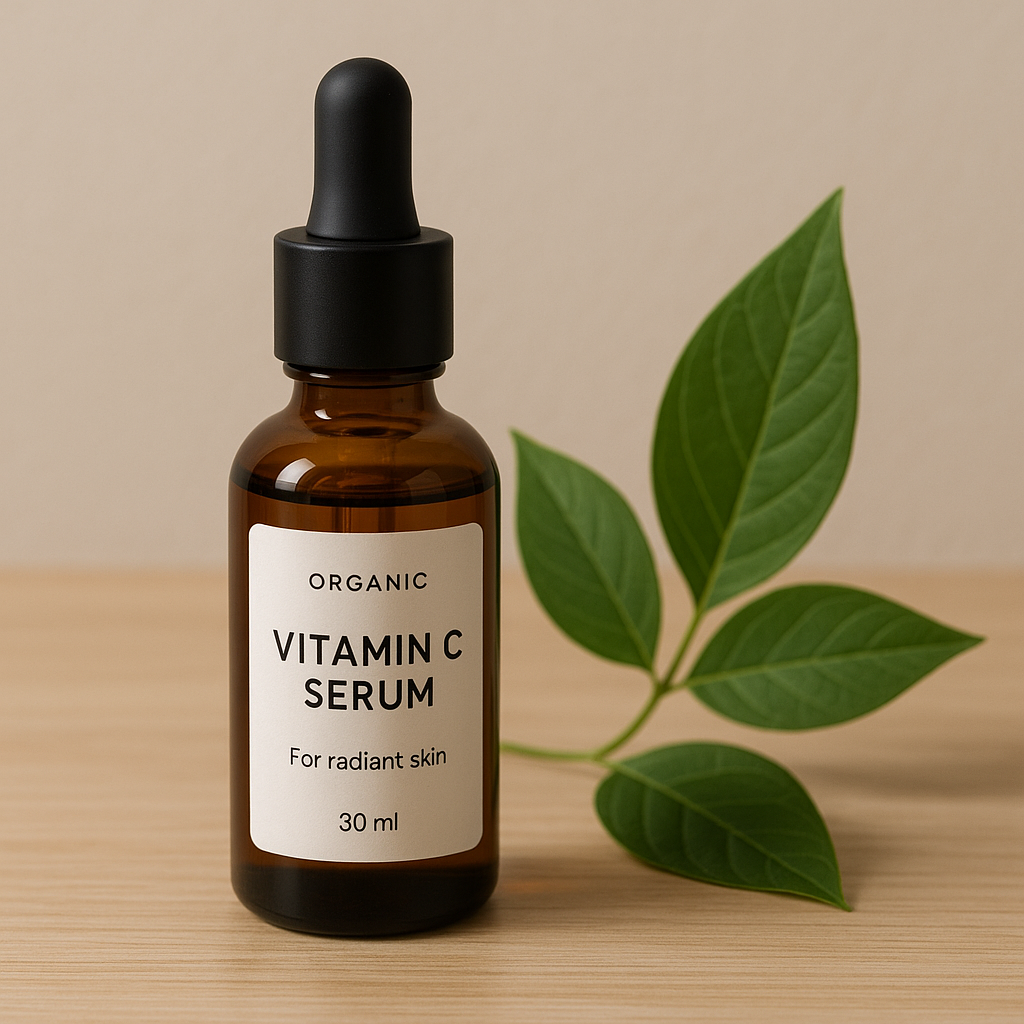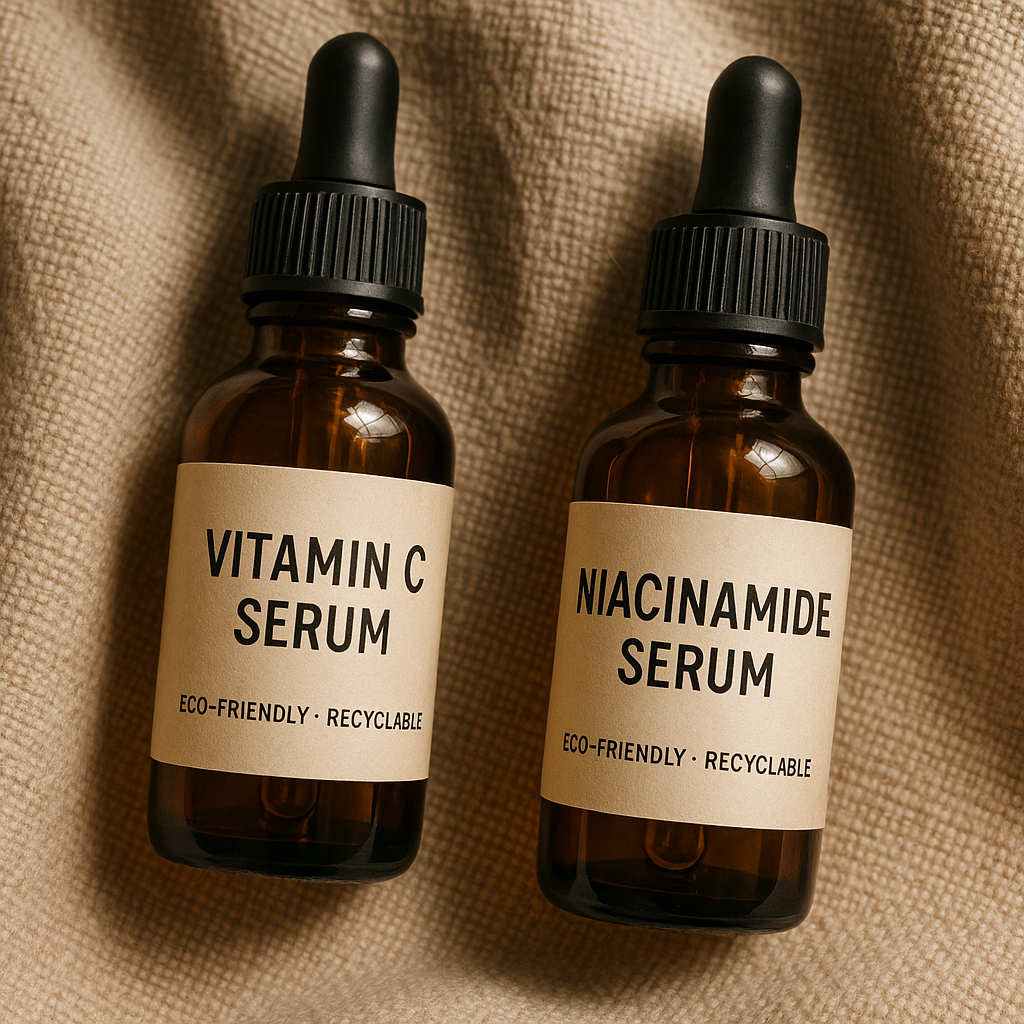
Product Comparison: Vitamin C vs Niacinamide for Radiant Skin
Share
Vitamin C and niacinamide are two of the most celebrated skincare ingredients today.
But what exactly sets them apart?
This product comparison: vitamin C vs niacinamide cheatsheet will guide you through their unique benefits and the best ways to use them.
Some are powerhouse antioxidants that defend skin from environmental stress.
Some are gentle heroes that soothe sensitive, easily irritated skin.
Some deliver brightening effects that fade dark spots and even tone.
Some boost natural collagen production to keep skin resilient and supple.
Some combine effortlessly for a double dose of care—and others require layering knowing.
Let's dive right in.
What Are Vitamin C and Niacinamide?
Vitamin C, also known as ascorbic acid or its derivatives, is a vital antioxidant renowned for protecting skin against environmental aggressors like UV rays and pollution. It plays an essential role in collagen synthesis and acts as a brightening magnet to fade dark spots.
Niacinamide, a form of vitamin B3, is celebrated in skincare for its versatility and gentleness. It targets inflammation, regulates sebum production, strengthens the skin barrier, and helps diminish uneven tone and texture.
Both ingredients have rich scientific backing and are staples in clean, vegan, and cruelty-free routines.
Each leverages a unique pathway to healthier skin but shares a commitment to gentle efficacy, making them perfect fits for eco-conscious and sensitive skin enthusiasts.[source]
Key Benefits of Vitamin C
Vitamin C's popularity stems from its multi-faceted impact on skin health. Here’s why it’s a treasured actives in skincare:
- Brightening Power: Vitamin C inhibits melanin production, which reduces dark spots and hyperpigmentation, unveiling a more even and radiant complexion.
- Antioxidant Defense: It shields the skin from oxidative stress caused by pollution and UV exposure, which contributes to premature ageing.
- Collagen Boosting: Vital for collagen stabilization and synthesis, vitamin C helps maintain skin firmness and reduce the appearance of fine lines.
- Soothing Anti-Inflammatory Effect: It calms redness and irritation, beneficial for sensitive and acne-prone skin.
Many organic vitamin C serums combine natural actives like hyaluronic acid and plant extracts to hydrate and protect skin's delicate balance.[source]
Trustworthy formulations avoid synthetic fragrances and colors, focusing instead on sustainably sourced ingredients certified by COSMOS, which ensures purity and environmental care.

Key Benefits of Niacinamide
Niacinamide is beloved for its gentle yet broad spectrum of benefits that make it a gentler alternative or complement to vitamin C, especially for sensitive skin types:
- Reduces Inflammation: It calms irritated, redness-prone skin, perfect for those with sensitive or reactive 'skin souls.'
- Sebum Regulation: Controls excess oil production, reducing the likelihood of breakouts and minimizing pores.
- Skin Barrier Strengthening: Enhances the skin’s natural moisture retention by supporting ceramide production.
- Brightening and Even Tone: Niacinamide inhibits the transfer of pigment within the skin, helping to fade age spots and improve clarity.
- Supports Collagen Synthesis: It encourages the formation of collagen, contributing to resilience and elasticity.
These benefits are why niacinamide often appears in products aimed at hyperpigmentation, acne scars, and improving the skin’s texture.
Lulumine’s niacinamide serums are formulated with 90%+ organic ingredients, cruelty-free, and gentle enough for daily use on sensitive skin.[source]
How to Choose Between Vitamin C and Niacinamide?
Choosing between vitamin C and niacinamide doesn’t have to be a ‘one-or-the-other’ dilemma, but understanding your skin’s needs helps you decide when and how to use each.
Consider your primary skin concerns:
- Want bright, radiant, and resilient skin? Vitamin C’s antioxidant and collagen-boosting action may be your first pick.
- Have sensitive, redness-prone, or oily skin? Niacinamide’s soothing, barrier-strengthening qualities could be better suited.
- Targeting dark spots and uneven texture? Both can work beautifully—vitamin C blocks pigment production while niacinamide limits pigment spread.
Remember, vitamin C can sometimes irritate very sensitive skin, so starting slow or trying COSMOS certified organic, fragrance-free formulations like Lulumine’s helps reduce risk.
Niacinamide tends to be gentler but is equally effective, especially when combined consciously with complementary ingredients like hyaluronic acid.
Can You Use Vitamin C and Niacinamide Together?
Yes, you can—and often should—use vitamin C and niacinamide together in your routine to harness their complementary benefits.
While outdated opinions suggested these ingredients cancelled each other out, recent expert dermatology consensus encourages their combination for enhanced results.[source]
Vitamin C and niacinamide target skin health through different pathways, meaning combined use tackles issues more thoroughly.
- Vitamin C blocks melanin synthesis, inhibiting new pigment production.
- Niacinamide prevents pigment transfer to skin cells, disrupting the pigmentation process further downstream.
- Both stimulate collagen generation through distinct mechanisms.
Proper layering is key: apply vitamin C serum first, allow it to absorb (~1 minute), then follow with a niacinamide serum before moisturizing.
For particularly sensitive skin, use vitamin C in the morning alongside sunscreen and niacinamide in the evening to minimise irritation.
Layering these powerful antioxidants can give your skin a fortified defence against environmental damage and age-related changes.
Feeling overwhelmed by ingredient combos? Remember, a gentle, minimalist routine with thoughtfully selected formulations often outperforms overly complex layering.
Tips for Sensitive Skin: Gentle Use and Layering
Sensitive skin deserves extra care when introducing active ingredients like vitamin C and niacinamide.
Here’s how to nurture your skin while seeing the benefits:
- Choose fragrance-free, COSMOS certified organic products like those from Lulumine to reduce synthetic irritants.
- Patch test each new serum on a small area before full-face application.
- Start slowly, using these serums every other day or as tolerated, before increasing frequency.
- Apply vitamin C in the morning, finished with your vegan, cruelty-free sunscreen to optimize protection.
- Use niacinamide in the evening or layered after vitamin C serum to strengthen your skin barrier.
- Moisturize with an organic, fragrance-free lotion to soothe and lock in hydration. Discover our guide on choosing the right fragrance-free face moisturizer for sensitive skin.
This gentle approach fosters resilience and reduces the risk of irritation while allowing your skin to reap these super ingredients' full benefits.
Sustainability Considerations for Conscious Consumers
Lulumine takes a mindful approach to skincare that nurtures both your skin and our planet.
When comparing products like those with vitamin C and niacinamide, keep these sustainability factors in mind:
- Organic Sourcing: Look for COSMOS certified products ensuring 90%+ organic content from responsibly farmed ingredients.
- Vegan and Cruelty-Free: Both vitamins are vegan-friendly, but ethical certification ensures no animal testing or animal-derived materials.
- Recyclable Packaging: Packaging that reduces waste and uses eco-friendly materials helps minimise environmental impact.
- Minimalist Formulations: Avoid unnecessary synthetic additives, colours, or fragrances that can irritate skin and pollute ecosystems.
Choosing brands committed to sustainability amplifies your self-care with a mindful, compassionate ethos that extends beyond the skin.
Explore more about COSMOS certified organic skincare benefits for sensitive and sustainable beauty.

Frequently Asked Questions
Is vitamin C suitable for sensitive skin?
Vitamin C can sometimes cause mild irritation, especially in higher concentrations or synthetic forms. Choosing organic, fragrance-free vitamin C serums and introducing them gradually reduces this risk. Formulations with derivatives like 3-O-Ethyl Ascorbic Acid are often gentler.[source]
Can niacinamide reduce dark spots as effectively as vitamin C?
Niacinamide targets pigmentation differently—by inhibiting melanosome transfer rather than melanin synthesis. Combining niacinamide and vitamin C offers a more comprehensive approach to brightening and fading dark spots.
Should I use vitamin C and niacinamide at the same time?
Yes, you can layer them. Apply vitamin C first, then niacinamide. For sensitive skin, consider using vitamin C in the morning and niacinamide at night to minimise irritation. Both provide antioxidant protection and skin repair benefits.
Are organic skincare products more effective?
Organic products, especially those with COSMOS certification, ensure high-quality, naturally derived actives combined with sustainability. Efficacy depends on formulation and concentration, but organic options often avoid irritating synthetic chemicals, benefitting sensitive skin.
What is the best way to layer vitamin C serum in my routine?
After cleansing and toning, apply vitamin C serum. Allow it to absorb before following with niacinamide serum or moisturizer. Always finish with a broad-spectrum, vegan sunscreen during the day.
Can I use vitamin C serum all year round?
Yes. Vitamin C is beneficial year-round for antioxidant protection and brightening. Applying it with sunscreen is essential to maximize benefits and protect against UV damage.
What ingredients pair well with niacinamide?
Niacinamide works well with hyaluronic acid for hydration and vitamin C for brightening. It’s also compatible with gentle exfoliants like glycolic acid when introduced carefully.
Where can I find gentle, vegan serums with vitamin C or niacinamide?
Lulumine offers a curated selection of COSMOS certified organic serums designed for sensitive skin. Their products embody vegan, cruelty-free values with transparent, science-backed ingredients.
What’s Your Next Step?
Now that you understand the unique strengths of vitamin C and niacinamide, which ingredient aligns best with your skincare needs?
Consider trying gentle, conscious formulations that respect your skin’s sensitivity and support sustainable beauty.
For a radiant, balanced complexion, layering vitamin C and niacinamide thoughtfully can be your winning formula.
Explore expert tips on niacinamide serum benefits and elevate your skincare journey with products that nurture skin and soul.
| Aspect | Vitamin C | Niacinamide |
|---|---|---|
| Vitamin Type | Vitamin C (Ascorbic Acid and derivatives) | Vitamin B3 (Niacinamide) |
| Primary Benefits | Brightening, antioxidant, collagen production | Reduces inflammation, regulates sebum, strengthens barrier |
| Best For | Dull, uneven tone, signs of ageing | Sensitive, redness-prone, oily, acne-prone skin |
| Potential Irritation | Possible in high concentrations or synthetic forms | Generally well-tolerated, very gentle |
| Usage Time | Morning (with sunscreen) | Morning or evening; often layered post-vitamin C |
| Sustainability | Effective organic, vegan options available | Cruelty-free, organic formulations common |
Takeaway: Harness the best of both worlds by combining vitamin C and niacinamide wisely, choosing gentle, certified organic products that align with your lifestyle and skin needs.
Explore expert guides on related beauty treatments and how mindful choices extend beyond skincare.
